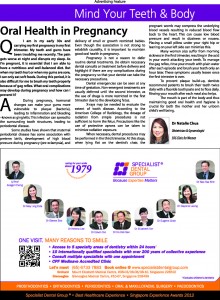 This article first appeared in the June 19th, 2014 issue of The Straits Times Mind Your Body. We have reproduced it for the information of those of you who missed it when it was published.
This article first appeared in the June 19th, 2014 issue of The Straits Times Mind Your Body. We have reproduced it for the information of those of you who missed it when it was published.
Q: I am in my early 30s and carrying my first pregnancy in my first trimester. My teeth and gums have been troubling me recently. The pain gets worse at night and disrupts my sleep. As I’m pregnant, it is essential that I am able to have a nutritious and well-balanced diet. But when my teeth hurt or when my gums are sore, I can only eat soft foods. During this period, it is also difficult for me to brush my teeth properly because of gag reflex. What oral complications may develop during pregnancy and how can I prevent it?
A: During pregnancy, hormonal changes can make your gums more vulnerable to plaque (bacteria), leading to inflammation and bleeding –known as gingivitis. This infection can spread to the surrounding tooth structures, leading to periodontal disease.
Some studies have shown that maternal periodontal disease has some association with preterm birth, development of high blood pressure during pregnancy (pre-eclampsia), and delivery of small or growth restricted babies. Even though the association is not strong to establish causality, it is important to maintain good oral health in pregnancy.
Pregnancy is not a reason to defer routine dental treatments. Do obtain necessary dental consults or treatment before delivery and highlight if there are any complications during the pregnancy so that your dentist can take the necessary precautions.
Dental emergencies can be seen at any time of gestation. Non-emergent treatments are usually deferred until the second trimester, as the use of drugs is more restricted in the first trimester due to the developing fetus.
X-rays may be needed to evaluate the extent of tooth disease. According to the American College of Radiology, the dosage of radiation from simple procedures is not sufficient to harm the fetus. Precautions like the use of protective aprons can be taken to minimize radiation exposure.
When necessary, dental procedures may be performed in the third trimester. At this stage, when lying flat on the dentist’s chair, the pregnant womb may compress the underlying blood vessels resulting in reduced blood flow back to the heart. This can cause low blood pressure and result in dizziness or nausea. Placing a small pillow under your right hip or leaning on your left side can minimize this.
Many women also suffer from morning sickness in the first trimester, resulting in the acid in your vomit attacking your teeth. To manage the gag reflex, rinse your mouth with plain water after each episode and brush your teeth only an hour later. These symptoms usually lessen once the first trimester is over.
To prevent plaque build-up, dentists recommend patients to brush their teeth twice daily with a fluoride toothpaste and to floss daily. Rinsing your mouth after each meal also helps.
The mouth is part of the body and thus maintaining good oral health and hygiene is crucial for both the mother and her unborn child’s well being.
Obstetrician & Gynaecologist
Source: © Singapore Press Holdings Limited. Reproduced with permission






